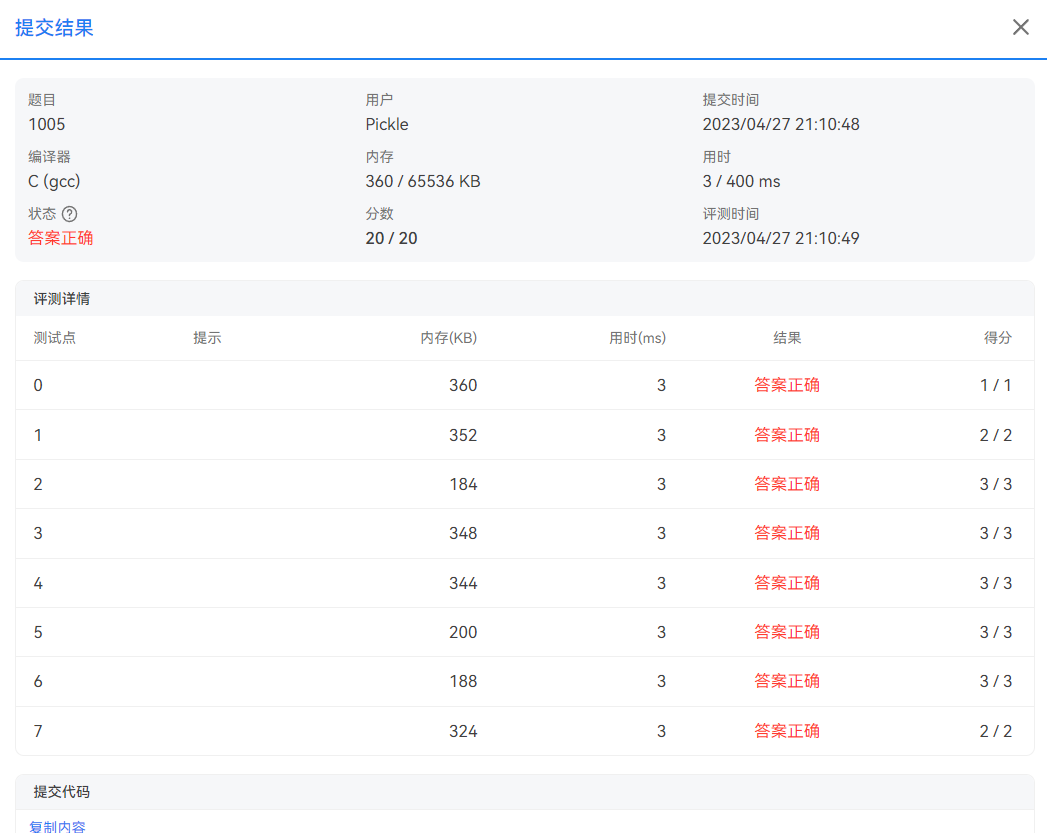非常简单的一题了,但还是交了两三次,原因:对数组的理解不足;对数字和字符之间的转换不够敏感。这将在下文中细说。
Given a non-negative integer N, your task is to compute the sum of all the digits of N, and output every digit of the sum in English.
Input Specification:
Each input file contains one test case. Each case occupies one line which contains an N (≤10100).
Output Specification:
For each test case, output in one line the digits of the sum in English words. There must be one space between two consecutive words, but no extra space at the end of a line.
Sample Input:
12345
Sample Output:
one five
题目分析
输入一串数字,然后用英文表达所有数字相加和的每一位数字。
输入:10100以内的数字
输出:和的每位数字英文表达(eg:sum=256,output=two five six)
首先很明显代码是不会翻译你的结果的,所有用一个数组来存储表示每位数字的英文,其次,10100的数字不需要精准表示,因为这里也就100个数字,不是10100个数字,开始我在这卡了半天,想着数字太大要精准存储,特地翻了之前写的c语言-大数阶乘 - 1001010 - 博客园 (cnblogs.com)一文,后面发现不大行的通,审视一遍后发现了问题,最后输出,要怎么拆开数字和也是个问题。
个人想法
首先,还是从变量入手
1 #define MAX 100 2 int N,m;//输入N,用于统计N的位数m 3 char lan[10][10] = { "zero","one","two","three","four","five","six","seven","eight","nine" }; 4 int sum,a[MAX];//计算和sum,数组a用来记录拆开的sum 5 char n[MAX];
这里开始是想N用来输入数据,后面发现循环过程中因为不知道它的位数,所以往往遍历要很多【补:而且N作为int变量放不了100位,double型的时候可以,但sum作为int不能让N强转,都作为double时就会很麻烦】,所以在错了一次后采取了 char n[MAX]; 的写法,这样有很多的妙处:
- 可以利用字符串来进行自动分割,即在输入时不赋值在地址上(n的每位地址),scanf("%s", &n[i]); ❌ scanf("%s", &n);❌ scanf("%s", n);✔ c语言因为只接受字符,不支持string,写成这样就会自动把一串数字字符串分成单独的数字字符并赋值在每个空间单位上。
- 循环遍历时,不需要知道有几位,因为每个字符是被附在每个单位空间上的,所以这个数组遍历到空,即'�'就可以停止。
- 由于得到的是字符的地址(数字自生的ACII值),所以在计算sum时,不用强转,而是减去0的ACII值,这个差不仅是地址差也非常融洽的是数字之间的差。
到这里其实已经没有什么疑惑的点了,下面直接上完整代码。
1 #include<stdio.h> 2 3 #define MAX 150 4 int N,m; 5 char n[MAX]; 6 char lan[10][10] = { "zero","one","two","three","four","five","six","seven","eight","nine" }; 7 int sum,a[MAX]; 8 int main() { 9 scanf("%s", n); 10 for (int i = 0; n[i] != '�'; i++) { 11 sum += n[i] - '0'; 12 } 13 if (sum == 0){printf("zero");return 0;}//如果和等于0 ,那么直接输出“zero”就行。注意,这里必须return终止,因为数组a[-1]也是0 14 for (int i = 0; sum; i++) { 15 a[i] = sum % 10; 16 sum /= 10; 17 m += 1;//m记录sum的位数,但注意数组在使用时要减1,因为超范围了 18 }//sum最后等于0时即完成所有位数的记录,终止循环(非常巧妙) 19 20 printf("%s", lan[a[m - 1]]); 21 for(int i=m-2;i>=0;i--) 22 printf(" %s", lan[a[i]]);//老一套输出格式,每一位的数字对于英语组记录的每一位上的英文 23 24 return 0; 25 }

总结
- 数组的利用,例如本文对英语的存储采用了二维数组,由于是char型,每单位只存放一个字符,所以lan[10][10]有10行10列,每列存放一个字符,一行存放10个字符。如果列数不足或是刚好,就会因为没有读到 '�' 而出现连续输出,如下。每列只有5个单位,故原本“seven”就该停止却因为没有 '�' 而读取到下一行“eight”一直到“nine”才停下。同样还有上文提到的数组地址。

- 字符与数字的转换。
- 停止条件的巧妙使用,如这里for循环采用sum=0停止的条件,是我个人之前没看过的。
文章来源: 博客园
- 还没有人评论,欢迎说说您的想法!




 客服
客服


